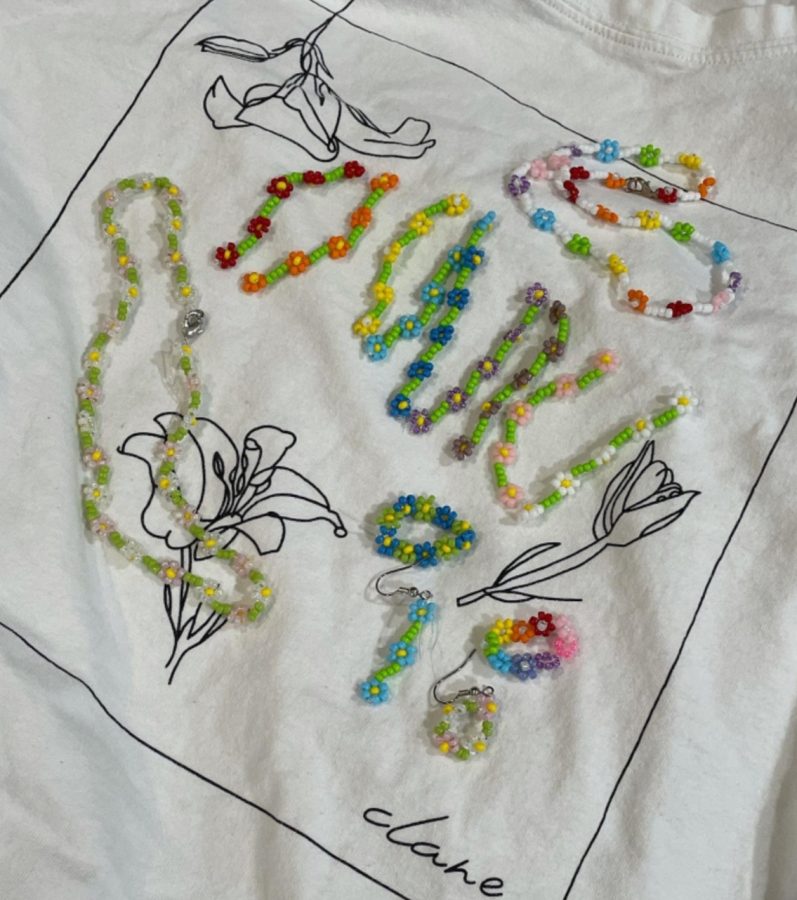UHS Student-Run Small Businesses
February 9, 2022
Due to their high school experience being upended by the pandemic, many students found themselves with extra time on their hands. As a result, throughout the course of the ongoing pandemic, there has been a notable increase in the amount of small businesses started by teenagers.
With the world more interconnected than ever in a web of constantly refreshing trends and ideas, it has never been easier to start a small business as a teeenager. Even prior to the pandemic, Gen Z has seen an increase in entrepreneurial aspiration, with an eightfold increase in teenage run businesses from 2009 to 2019 (The Guardian). Several UHS students have utilized these technological advances, turning their passions into their own shops.
Though it may seem daring to run a business while in high school, for some, starting a small business was simply the next logical step to take to extend the reach of their creations.
“It was always something I dreamt of doing as a kid, seeing art YouTubers make and sell their own merchandise,” senior Michelle Wang said. “So when my social media started growing more, I decided to start something and just see what would happen.”
Wang runs an Etsy shop under the name “nuttymelon” where she sells art prints and stickers of her original artwork. She opened the shop in July of 2021 as an extension of her social media where she regularly shares her work.
Junior Hannah Park, who runs “habeeb’s beads,” expressed similar motivations behind starting her Instagram shop. Park sells beaded jewelry and accessories, from custom made-to-order necklaces to phone charms.
“People began expressing interest in my jewelry . . . asking if I would ever sell them,” she said. “[That] gave me the green light that . . . people would support it and actually endorse it, not just my mom or my close friends.”
On the other hand, others have built small businesses around the goal of raising money for specific causes. Sophomore Cadence Diep’s original motivation when starting her baking business was to raise enough money to pay for the cost of joining the UHS Marching Band’s trip to Hawaii in the spring. Diep’s shop, Sweet Cadences, mainly sells specialty desserts, including cream puffs, lemon bars, fudge, and mochi.
“At first, I was just going to continue my business until I got enough money,” Diep said, “but since I’ve had such a positive response so far, I might continue it afterwards and give part of the profit back to the Color Guard program.”
Despite the varied reasons for starting their businesses, Wang, Park, and Diep all turned to online platforms to market and sell their products. With the ease of platforms, such as Etsy and Instagram, and the abundance of informational resources, anyone with a slight interest and Internet connection is capable of setting up a shop, all with relatively little risk and investment.
“I thought an Instagram account where I can show what I create was the best way to reach as many people as possible,” Park said. “These days social media is a very powerful tool . . . People can look at my feed and then DM me when they are ready to order something.”
Nevertheless, these small business owners still put an admirable amount of hours into setting up their businesses, an endeavor that takes more than it seems.
“I didn’t realize how much work goes into planning and buying, calculating the cost of a single dessert and how much you should charge,” Diep said. “I’ve also had to experiment a little more with recipes because I want the outcome to be as perfect as it can be for buyers.”
Though Wang utilized Etsy’s built-in domain and order manager, she too poured hours into the technical aspects of running a business. “I had to figure out stuff like shipping, SEO, customer service, as well as all the materials, as I wanted all the packaging to be sustainable,” she said.
In the end, their efforts proved to be fruitful, as their businesses have served as both a meaningful project and a small stream of income.
“It’s so incredibly fulfilling and humbling to see people enjoy my art and what I create,” Park said. “Being supported . . . and compensated for my art is so incredibly amazing. It’s not so much about the money as it is about the validation of people being positively impacted by my small business.”





